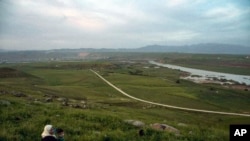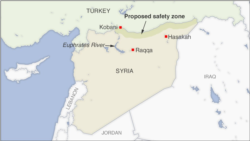Turkey Wednesday began a military operation in northern Syria against Kurdish fighters, days after the United States announced it was withdrawing troops from the area. The U.N. refugee agency earlier warned that a proposed safe zone along the Turkish-Syrian border would not protect civilians.
The UNHCR says it is concerned by the prospect of a so-called safe zone along Turkey’s border with a Kurdish-held enclave in northeastern Syria. The idea was originally proposed by U.S. President Donald Trump and has been embraced by his Turkish counterpart, Recep Tayyip Erdogan.
In anticipation of the military offensive now under way, preparations were being made to create a 32-kilometer safe zone on the Syrian side of the border. The plan was to clear the area of Kurds and house some of the 3.6 million Syrian refugees currently in Turkey. Ankara considers the Kurdish forces to be terrorists, but they are viewed by much of the West as key partners in the fight against the Islamic State terrorist group.
The U.N. agency says refugees within a particular geographical area are in need of international protection. UNHCR spokesman Adrian Edwards tells VOA such areas offer no protection for civilians.
“If you look historically at what has happened in safe zones, and we think here of what happened in the Balkans and elsewhere. The problem has been that areas of so-called safety have not proved safe. So, it is really absolutely essential that if there is to be an alternative form of protection of anyone who is displaced, that their safety is paramount and put first and foremost.”
Edwards cites the tragedy of Srebrenica as an example of a so-called safe zone gone horribly wrong. In 1993, the United Nations declared the besieged city of Srebrenica in Bosnia-Herzegovina a safe zone. Two years later, Bosnian Serbian nationalists massacred more than 8,000 Bosnian Muslim men and boys sheltering there.
Edwards notes humanitarians are not able to keep civilians safe in a designated protected area in the midst of a conflict.
“I think we have to put people at the forefront of our thinking here," he said. "We have to see exactly what the protection needs are going to be in this context, and we have to find solutions for that. The last thing we want to see is a bad history repeating itself.”
Edwards says the forces driving this conflict are political and have to be resolved at the political level. Without a solution or guarantees of safety, he warns civilians will be at risk from military action.






